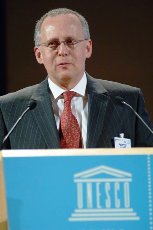
Geoscientist 21.09 October 2011
In 2004 Mr Boris Johnson MP, then editor of the Spectator, got himself into hot water by identifying what he saw as “a society … hooked on grief and … vicarious victimhood”. Nowhere was this more evident than among Liverpudlians, of whom he wrote: “they cannot accept that they might have made any contribution to their misfortunes, but seek rather to blame someone else for it, thereby deepening their sense of shared tribal grievance against the rest of society.”
When I read this I confess to having felt a sense of déjà lu - since for years I had been saying the same thing about scientists. Scientists have been rending their labcoats and wailing that nobody loves them for nearly 40 years now; despite all evidence to the contrary
1,2. While not realising the difference between “they don’t love us” and “they don’t love us as unconditionally as we would like”, scientists had also become half in love with easeful death.
This is not to deny that things have been tough. Locally, morale took a real battering after geology became the final full victim of the late, unlamented University Grants Committee’s last-gasp attempt at Stalinist national planning - which led to the closure of many fine Earth science departments. Geology seemed to fare little better in the subsequent “student-as-customer” world. The increasing invisibility of minority subjects - which always happens during expansions (comprehensivisation was meant to increase choice for all, but resulted in the near extinction of minority academic subjects in most schools) then kicked in during the 1990s. Even “core” subjects, including languages, felt like they were vanishing as less academic ‘customers’, flocked towards the new subjects created largely to cater for them.
But surely you don’t need to have been in the OTC (or worked in PR) to know defeatism begets defeat. Moreover, we have new reasons to be cheerful. Figures published here in June
3 indicated an upswing in applications to Earth science courses; while in August, A level and Scottish Higher results were indeed followed by recruitment boosts for all sciences, by 8% in physical science as a whole, and 2% in Earth science.
So – once again - it’s time to stop looking defeated, because if we do, we will be.
DR TED NIELD
Editor
References
- Science and the Public A Review of Science Communication and Public Attitudes to Science in Britain, OST Wellcome 2000
- Oh no, they love us after all. Media Monitor, Geoscientist 11.04 April 2001.
- Reasons to be cheerful? King, Chris and Jones, Ben. Geoscientist 21.05 pp19-21.